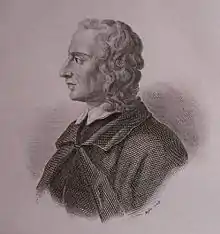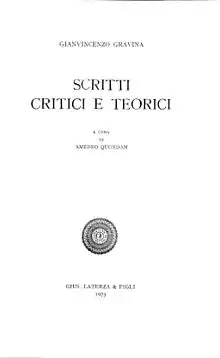Giovanni Vincenzo Gravina
Giovanni Vincenzo Gravina (20 January 1664 – 6 January 1718) was an Italian man of letters and jurist. He was born at Roggiano Gravina, a small town near Cosenza, in Calabria.[1] He was the adoptive father of the poet Metastasio.[2]
Gian Vincenzo Gravina | |
|---|---|
 Gian Vincenzo Gravina | |
| Born | 20 January 1664 Roggiano Gravina, Kingdom of Naples |
| Died | 6 January 1718 (aged 53) Rome, Papal States |
| Occupation | man of letters and jurist |
| Nationality | Italian |
| Period | 17th century |
| Notable works | Origines juris civilis De Romano imperio |
Biography
Giovanni Vincenzo Gravina was descended from a distinguished family. He was born at Roggiano near Cosenza, and was early sent to study with his maternal uncle, Gregorio Caloprese, who possessed some reputation as a poet and philosopher. Later he pursued legal studies under Serafino Biscardi in Naples, at the same time perfecting himself in Greek at the school of Gregorio Messere. In 1689 he went to Rome, where he lived at first with a member of the papal court, Paolo Coardo. In 1690, he united with several others of literary tastes in forming the Academy of Arcadians.[1]
His first work, De Corrupta Morali Doctrina, was published at Naples in 1691; his Opuscula, Rome, 1696, mainly dealt with educational questions. Pope Innocent XII made him professor of civil law at the Roman Sapienza in 1699; and in 1703 he passed to the chair of canon law.
A schism occurred in the Academy of Arcadians in 1711, and Gravina and his followers founded in opposition to it the Academy of Quirina. From Innocent XII Gravina received the offer of various ecclesiastical honors, but declined them from a disinclination to enter the clerical profession.[3]
The years 1714-16 he spent in Calabria resting and attending to the inheritance bequeathed him by Caloprese. He died two years later in Rome, survived by his mother, to whom he left his property in Calabria. His Roman possessions were left to his adoptive son Pietro Metastasio. Among the famous pupils of Gravina were Lorenzo Gori and Orazio Bianchi.
Works

Gravina was the author of a number of works of great erudition, the principal being his Origines juris civilis, completed in 3 vols (1713) and his De Romano imperio (1712).[2] The work of Gravina that is best remembered is his discourse on poetry, first published in 1708: Della Ragion Poetica libri due, e Della Tragedia libro.
See also
References
- Chisholm 1911, p. 383.
- Chisholm 1911, p. 384.
- Chisholm 1911, pp. 383–384.
Bibliography
- This article incorporates text from a publication now in the public domain: Chisholm, Hugh, ed. (1911). "Gravina, Giovanni Vincenzo". Encyclopædia Britannica. Vol. 12 (11th ed.). Cambridge University Press. pp. 383–384.
- Gravina, Gian Vincenzo (1973). Scritti critici e teorici. Scrittori d'Italia 255. Roma-Bari: Laterza. Retrieved 29 June 2015.
- Gravina, Gianvincenzo (2005). R. Gaetano (ed.). Della Ragion poetica. Soveria Mannelli: Rubbettino.
- San Mauro, Carla (2006). Gianvincenzo Gravina giurista e politico. Con un'appendice di scritti inediti. Milan: FrancoAngeli.